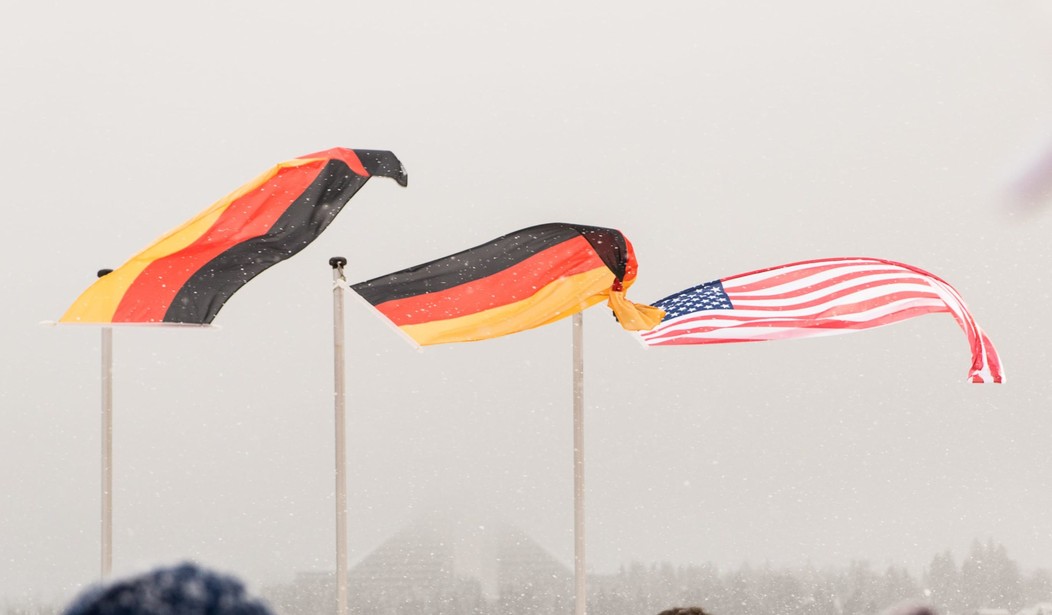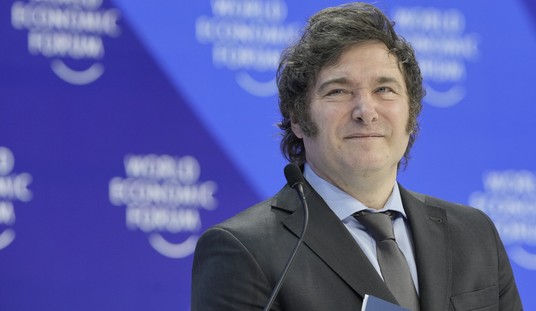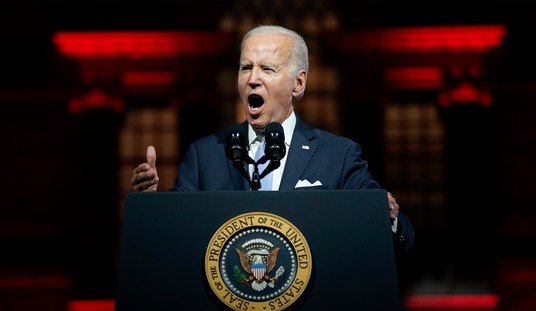The news came in a recent issue of the Frankfurter Allgemeine (FAZ): “Two years after President Trump’s inauguration, the Germans have lost much of their trust in the United States.” Eighty-five percent of respondents in an Atlantik-Brücke survey, reported FAZ, view the U.S. either “negatively” or “very negatively.” Many Germans look more favorably upon Communist China than upon the U.S.; more than half would like Germany to distance itself further from the U.S., with only thirteen percent wanting a closer relationship. Germans aren’t big on NATO, either: Only a quarter of those surveyed think their country should pay its agreed-upon share of the NATO budget. Many support the idea of an EU army. Of all the major political parties, only members of the anti-immigrant AfD are favorably disposed toward America.
None of this is remotely surprising. The recent discovery that Claas Relotius, a star reporter for Germany’s leading newsmagazine, Der Spiegel, had invented more than a dozen negative news stories about America drew renewed attention to the fact that, with or without Relotius onboard, Der Spiegel has long been a poisonously anti-American rag whose cover stories routinely depict America as a cartoon villain. As James Kirchick wrote in a commentary for The Atlantic, “Relotius told them what they wanted — what they expected — to hear about America.” The fact that his stories, many of them patently absurd, not only made it past Der Spiegel’s editors and fact-checkers but also didn’t raise readers’ eyebrows “revealed ugliness,” argued Kirchick, “within the publication as well as German society more broadly.” Yep.
But back to FAZ. It was predictable enough that FAZ would link the results of the Atlantik-Brücke poll to the Trump inauguration. But in fact German anti-Americanism has nothing to do with Trump. Of course anti-Americanism exists everywhere in the world, and especially in Europe, whose political and cultural elites viewed the democratic U.S. from the moment of its founding with aristocratic disdain. But contempt for the U.S. has always been especially intense — and irrational — in Germany, which has its own distinctive reasons (if that’s the right word) for despising the superpower across the sea.
The first European country I ever visited was Germany, and the most memorable aspect of the whole experience was my exposure — my first, but far from my last — to full-blown, raving, borderline-insane America-hatred. It was 1980, and I was in my first year of graduate school, and one of my classmates was a German girl who invited me to spend the Christmas holidays with her in her homeland. It was a busy trip: we drove around much of central Germany, hung out with people she knew in various cities, and crashed with college friends of hers at Heidelberg and Tübingen universities. One after another of these young Germans felt compelled to make it clear to me at once that they despised my country. In fact they couldn’t shut up about it — whenever I was present, it was pretty much the only topic of conversation. Yes, it was explained to me, Germany had been the bad guy a few decades earlier, but now the U.S. was the bad guy. This, mind you, at a time when their own country was divided in two by the Iron Curtain, and when the only thing keeping their own part of it — the free part, the prosperous part — from being overrun by the Red Army was the U.S. military presence in their midst.
I’ve been back to Germany many times since. I visited Berlin while folks were still chipping away at the Wall for souvenirs. Most recently I was in Hamburg, where I stayed in a neighborhood in which half of the women wore hijab and the principal architectural feature was a gigantic mosque. Although the idea of traveling to Germany for pleasure hasn’t seemed too pleasurable since Angela Merkel opened up the floodgates in 2015, I’ve mostly enjoyed my trips to that country. But no matter who was the U.S. president or what issues were in the headlines, the anti-Americanism persisted, invariably attributed to some recent U.S. action. Still, as quick as Germans are to run down the U.S., it’s impossible to get an honest answer out of them when you ask about the Muslim takeover of their country.
Not to overgeneralize, but I think the German attitude toward Americans can be summed up in large part by something a German woman said to me a couple of decades ago. We were both new in Norway, and were taking a Norwegian language course along with a dozen or so other adults from a dozen or so other countries. None of our fellow classmates ever said anything insulting to me. But one day while we were all standing in the corridor waiting for the teacher to come and unlock the door, the German woman looked me up and down and said: “Don’t you own an iron?” That’s how Germans see Americans: as people too undisciplined to iron a shirt before going out. Disorderly. Essentially unserious. Superficial. Materialistic and spoiled, in that we’re too busy snapping up new things at the store to take proper care of the things we already have. Unforgivably, we embody the casualness – not just in attire, but in all things – that characterizes modern free societies and that is anathema to the very essence of Germanness. (In the U.S., we eschew honorifics; in Germany they gleefully pile them up on top of one another like corpses at a death camp: “Herr Doktor Professor.”)
Of course, Germans also hate America because it’s a superpower — a superpower, moreover, just to rub it in, that, being isolationist at heart, never really set out to be a superpower, and that has accepted that role only out of concern for the preservation of international order and freedom. Germany, on the contrary, has been aching to be a superpower from the git-go. It has longed to rule. Back in the middle of the last century it went all in on the effort to control the world and failed disastrously — and America alone, through the Marshall Plan, helped it to get back on its feet, repaying genocidal megalomania with magnanimous generosity. Who could ever forgive that?
The most sensible journalist in Germany, Henryk M. Broder, noted in a 2013 article for Die Welt that his countrymen’s “viciously romantic anti-Americanism” dates back to the Nineteenth Century. During the Vietnam War, he recalled, Germans chanted “USA, SA, SS!” After 9/11, they said that the U.S. was getting what it deserved for having bombed Dresden and Hiroshima. Summing up the general attitude, Broder wrote: “Maybe we have a shameful past, but the Americans have a shameful present.” For Germans, demonizing America is a handy way of dealing with — or, rather, not dealing with — their own history.
In 2014, Eric T. Hansen, an American freelance writer based in Berlin, amusingly recounted in Die Zeit his unsuccessful efforts to sell articles to American publications about various events that revealed the dark underside of Germany. Alas, he discovered that Americans weren’t interested in “Germany- bashing”; by contrast, if the same events had taken place in America, “you would be able to read about them in the German newspapers the next morning.” Hansen observed that anti-Americanism is not only “socially acceptable in Germany”; it’s “downright politically incorrect to miss an opportunity” to put America down. He offered a theory: While the loss of World War II had rendered anti-Semitism verboten, “the resulting vacuum was soon filled by anti-Americanism.” I’m not going to argue with that.
In 2015, the German writer Rainer Werner reported at his blog on a recent Allensbach Institute poll about attitudes toward the United States. Like the Atlantik-Brücke survey, it showed that a “large majority” of Germans disliked the U.S., seeing it as a vulgar consumer society and rejecting the notion that the U.S. is “a champion of freedom and human rights.” Another poll, this one by Pew Research Center, indicated that of all America’s allies, the Germans were second only to the Turks in viewing it unsympathetically. According to Pew, Africans and Latin Americans were far more pro-American than Germans; in Vietnam, 78 percent had positive attitudes toward the United States.
The Pew survey also showed that while only 38 percent of Germans “would be prepared to assist in the event of an attack by Russia on a NATO country under Article 5 of the NATO Treaty,” two-thirds of Germans assumed “that the United States would use military force and defend the beleaguered country.” In other words, Germans have no interest in defending anybody, perhaps even including themselves, but they take for granted America’s readiness to defend them. Yet instead of being grateful for this — let alone ashamed — they use it as an excuse to view themselves as peaceable and Americans as militaristic.
Describing himself as a member of the ’68 generation, Werner remembered that “USA, SA, SS” chant so beloved of his agemates during the Vietnam War era. Yet if they all hated America so much, Werner wondered, how was it that they so slavishly “copied the style of the American subculture (the hippie movement), danced to the songs of American bands, and reveled in Hollywood films?” Nowadays, he added, “no young person, no matter how critical of the U.S., wants to renounce the blessings of Google, Facebook, Twitter, Apple and Co.” How, he asked, can this be? To me, the question answers itself: Imperial ambitions are in the German DNA, and no people possessed of such ambitions enjoy living in the shadow — and, especially, under the benevolent protection — of another country.
Asked in that 2015 Pew survey why they were so hostile to the U.S., Germans cited, among other things, President Obama’s failure to close Guantánamo. But there’s always a reason, no matter who happens to be the current president of the United States and what he has or hasn’t done. Alexander Grau, a German philosopher, pondered this point in a cogent 2014 article: While Germans may attribute their anti-American sentiments to their distaste for a given American leader or American policy, “German reservations about the U.S. are older and deeper. The new anti-Americanism is an old anti-Americanism,” founded in Nineteenth Century hostility to mass society, mechanization, and a “ruthless capitalism” associated in the German mind with both America and — ahem — “international financial Jewry.”
How, in Grau’s view, does World War II play into this? West Germans knew America had saved them from Soviet conquest, and were (at first) thankful. But that gratitude eventually curdled into an “anti-American neurosis” that led them, in later years, to express “solidarity with the most obnoxious autocrats in the world,” from Saddam to Assad, simply because they were America’s enemies. “America,” wrote Grau, “represents just about everything that is frowned upon in this country: individualism, personal responsibility, skepticism toward the state, capitalism.” But most offensive of all to Germans, Grau suggested, is “the idea of freedom,” which brings with it “competition instead of a comfortable collective economy and dissent instead of cozy consensus.”
Yep. It’s not that Germans don’t enjoy their own freedom. But many — most? — of them don’t appreciate it, and certainly don’t sing about it. When they see Americans at the Super Bowl standing with their hands over their hearts while some chanteuse warbles about “the land of the free,” Germans just can’t relate. I don’t know how many times I’ve had to listen to some German mocking the idea that America is free, or mocking Americans for making such a big deal about it, or, alternatively, mocking Americans for actually believing that they’re free. In any case, the idea of freedom doesn’t resonate for them as it does for us. Their ancestors fought wars of conquest, and they understand that; but they’ll never be able to fully process the fact that Americans actually fought a war to free them from a psychopathic dictator whom they had followed, in mindless obedience, to the gates of Hell. Imagine knowing that and having to live with it! How could a proud and arrogant people in such a situation not find their thankfulness toward the nation that saved them being twisted into a ghoulish hatred?








Join the conversation as a VIP Member